Introduction
Do you often feel a burning pain in your stomach or constant acidity after meals? You might be suffering from a gastric ulcer — a common digestive problem affecting millions of Indians today.
Gastric ulcers, also known as stomach ulcers, occur when the protective lining of the stomach gets damaged, allowing stomach acid to create painful sores.
This condition can cause stomach pain, heartburn, acidity, and indigestion — but the good news is that with early diagnosis, proper medication, and healthy lifestyle changes, it can be managed effectively.
In this Quickobook health guide, we’ll cover everything you need to know about gastric ulcers — from causes and symptoms to treatment and prevention — so you can take charge of your digestive health and live pain-free.
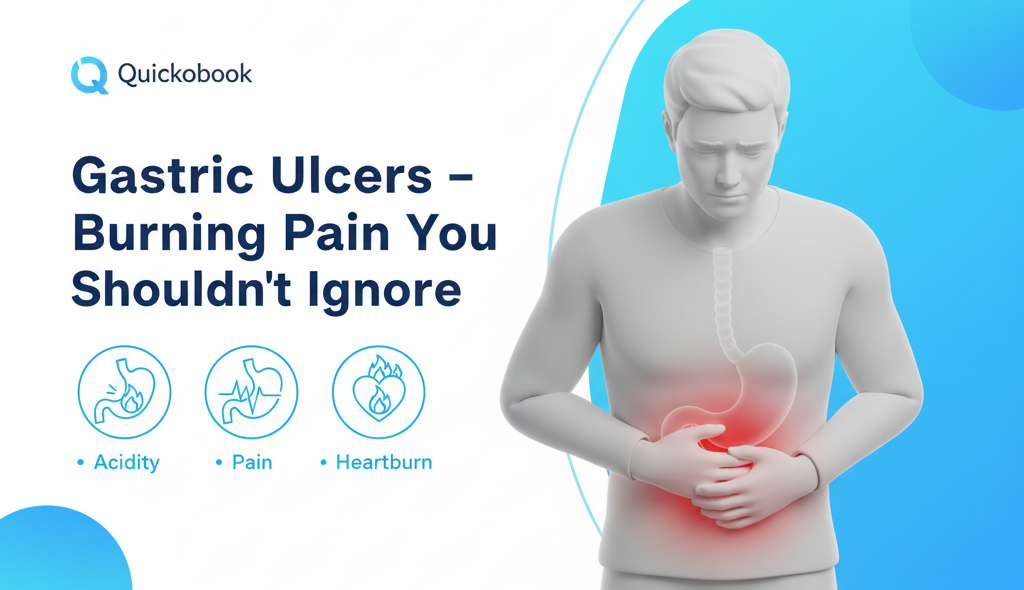
What is a Gastric Ulcer?
A gastric ulcer is a type of peptic ulcer that forms on the lining of the stomach. It happens when the balance between the acid that digests food and the mucus that protects your stomach gets disturbed.
When acid eats away at the protective lining, it forms open sores or wounds called ulcers. These sores can cause a sharp or burning pain, especially after eating or on an empty stomach.
Quick Facts
- Common in adults aged 25–60 years.
- More frequent in people who smoke or take painkillers regularly.
- Can be treated successfully with medication and dietary care.
Causes of Gastric Ulcers
Understanding what causes gastric ulcers helps in both treatment and prevention. The most common causes include:
1. Helicobacter pylori infection
This bacteria (H. pylori) weakens the protective mucus of the stomach, allowing acid to cause inflammation and ulcers. It’s one of the main causes in India.
2. Regular use of painkillers
Frequent use of NSAIDs (like ibuprofen or aspirin) reduces the stomach’s protective mucus, making it more prone to acid damage.
3. Excess stomach acid
Conditions like acidity or Zollinger-Ellison syndrome increase acid levels, leading to ulcers.
4. Smoking and alcohol
Tobacco and alcohol irritate the stomach lining and slow down healing.
5. Stress and irregular eating
Skipping meals, eating spicy food, or living under constant stress may worsen ulcer symptoms.
Symptoms of Gastric Ulcers
Ulcer symptoms can range from mild to severe. Common signs include:
- Burning stomach pain, often between meals or at night
- Acidity or heartburn
- Bloating or a feeling of fullness after eating
- Nausea or vomiting
- Loss of appetite or weight loss
- Dark stools or blood in vomit (in severe cases)
If these symptoms persist, consult a Quickobook doctor immediately.
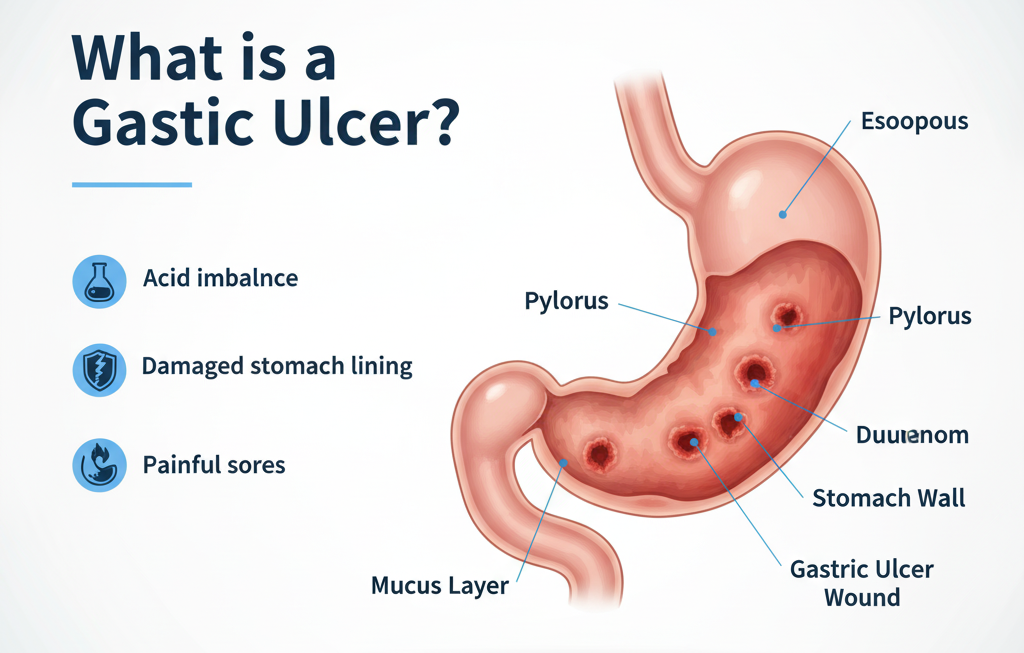
Diagnosis of Gastric Ulcers
To confirm a gastric ulcer, your doctor may recommend:
- Endoscopy – a thin tube with a camera is inserted through your mouth to view the ulcer.
- H. pylori test – breath, stool, or blood tests can detect bacterial infection.
- X-ray with barium meal – highlights ulcers in the stomach lining.
Early diagnosis is key to preventing complications like internal bleeding or stomach perforation.
READ ALSO: 7 Everyday Habits To Improve Your Lung Health
Treatment for Gastric Ulcers
Treatment aims to relieve pain, heal the ulcer, and prevent recurrence. Common approaches include:
1. Medications
- Antibiotics – to kill H. pylori bacteria.
- Proton pump inhibitors (PPIs) – reduce acid production.
- Antacids – neutralize stomach acid and provide quick relief.
- H2 blockers – lower acid release.
(Always take medicines as prescribed by your doctor.)
2. Diet and Lifestyle
- Eat small, frequent meals.
- Avoid spicy, oily, and fried foods.
- Quit smoking and alcohol.
- Manage stress through yoga, meditation, or breathing exercises.
3. Regular Check-ups
If symptoms return, visit your Quickobook doctor for follow-up treatment and lifestyle guidance.
Healthy Lifestyle Tips
- Drink plenty of water to maintain digestion.
- Eat slowly and avoid lying down right after meals.
- Include foods like banana, curd, oats, and coconut water.
- Avoid carbonated drinks, coffee, and late-night snacking.
- Exercise regularly to reduce stress-related acid production.
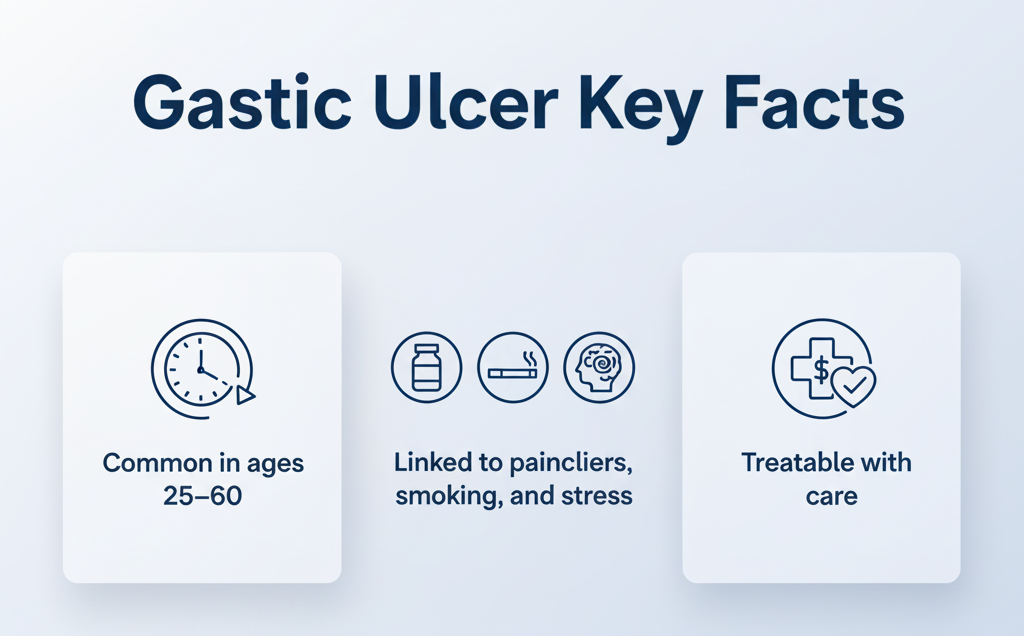
Prevention of Gastric Ulcers
Here’s how to prevent gastric ulcers and maintain good digestive health:
- Don’t overuse painkillers — ask your doctor for safer alternatives.
- Wash hands and food properly to prevent Helicobacter pylori infection.
- Eat balanced meals rich in fiber, fruits, and vegetables.
- Avoid smoking and alcohol.
- Manage stress effectively.
- Schedule regular health check-ups with your Quickobook doctor.
When to See a Doctor
Seek medical help if you experience:
- Severe abdominal pain
- Blood in vomit or stool
- Unexplained weight loss
- Persistent nausea or vomiting
- Pain that doesn’t go away with medication
Don’t ignore early signs — timely care can prevent serious complications.
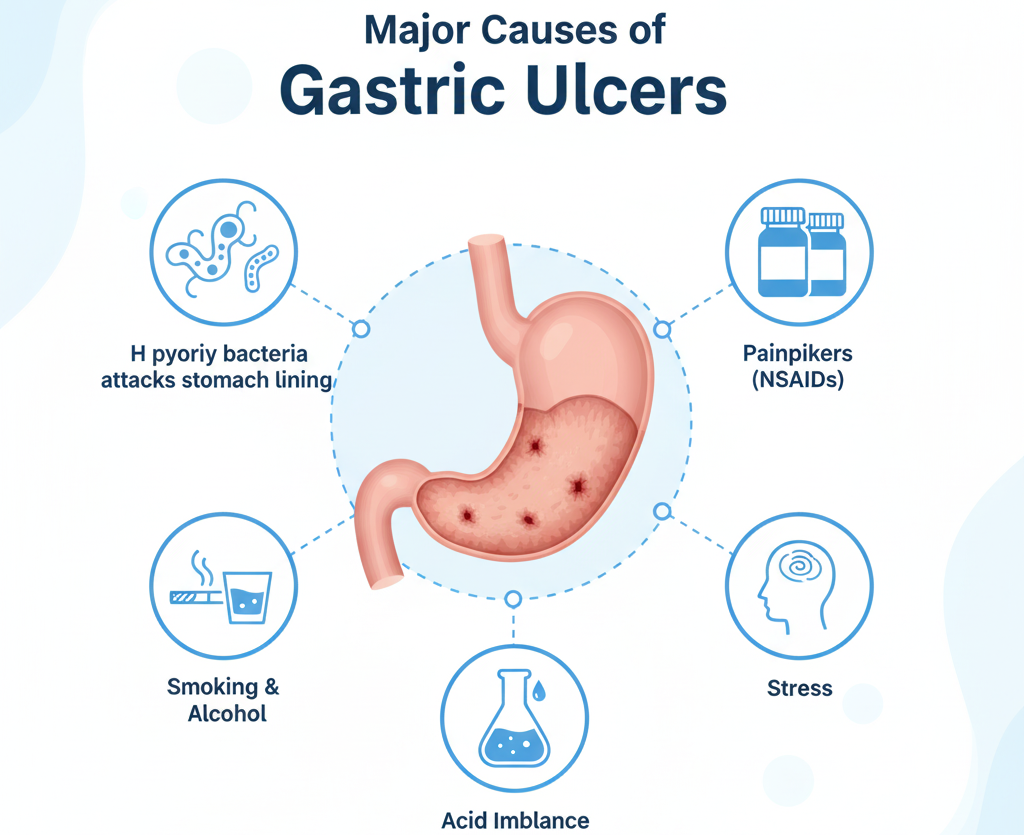
Complications of Untreated Gastric Ulcers
If left untreated, ulcers can cause:
- Internal bleeding
- Stomach perforation (a hole in the stomach wall)
- Infection in the abdominal cavity (peritonitis)
- Gastric cancer (in rare, chronic cases)
Conclusion
A gastric ulcer doesn’t have to rule your life. With the right ulcer treatment, lifestyle changes, and regular check-ups, you can manage symptoms and heal completely.
If you suspect you have persistent acidity or stomach pain, don’t delay — connect with a Quickobook doctor near you for safe and effective care.
Taking care of your digestive health today ensures a healthier tomorrow.
1. What is a gastric ulcer?
A gastric ulcer is a sore in the lining of your stomach caused by acid damage.
2. What causes gastric ulcers?
The main causes are Helicobacter pylori infection and long-term painkiller use.
3. What are the common symptoms?
Burning stomach pain, heartburn, and bloating are key symptoms.
4. Can spicy food cause ulcers?
Spicy food doesn’t directly cause ulcers but can worsen the pain.
5. How is a gastric ulcer diagnosed?
Through endoscopy and tests for H. pylori bacteria.
6. Can stress cause ulcers?
Stress can worsen symptoms but doesn’t usually cause ulcers alone.
7. Are gastric ulcers curable?
Yes, with proper treatment and dietary changes, most heal completely.
8. What foods should I avoid?
Avoid fried, spicy, and acidic foods like citrus and tomatoes.
9. Can smoking cause ulcers?
Yes, smoking increases acid and delays healing.
10. Does alcohol worsen ulcers?
Yes, alcohol irritates the stomach and should be avoided.
11. Can ulcers lead to cancer?
Rarely, long-term untreated ulcers may lead to cancer.
12. How long does ulcer healing take?
Usually 4–8 weeks with correct treatment.
13. Is milk good for ulcers?
It may soothe pain temporarily but can increase acid later.
14. Are antibiotics necessary?
Yes, if H. pylori infection is present.
15. Can ulcers come back?
Yes, if causes like smoking or H. pylori persist.
16. What is Helicobacter pylori?
It’s a bacteria that infects the stomach and causes ulcers.
17. How is H. pylori treated?
With a combination of antibiotics and acid reducers.
18. Can I take painkillers with ulcers?
Only with your doctor’s approval — avoid NSAIDs.
19. What natural remedies help ulcers?
Banana, honey, and aloe vera may soothe stomach lining.
20. Does fasting worsen ulcers?
Yes, empty stomachs increase acid and pain.
21. Can yoga help ulcers?
Yes, it reduces stress and improves digestion.
22. Should I eat smaller meals?
Yes, smaller meals prevent acid overload.
23. Are ulcers contagious?
H. pylori can spread through saliva or food, so hygiene is key.
24. Can ulcers cause back pain?
Sometimes, severe ulcers radiate pain to the back.
25. Is surgery needed for ulcers?
Only in rare, complicated cases.
26. Can ulcers cause vomiting?
Yes, especially if severe or bleeding.
27. What’s the difference between gastritis and ulcer?
Gastritis is inflammation; ulcers are open sores.
28. Can ulcers cause bloating?
Yes, gas and fullness are common.
29. Is ulcer pain worse after eating?
Gastric ulcer pain often increases right after eating.
30. Do ulcers cause bad breath?
Yes, due to bacteria and acid imbalance.
31. Can ulcers heal naturally?
Mild cases can improve with diet and rest, but medical care is vital.
32. What are safe drinks for ulcers?
Water, coconut water, and herbal teas.
33. Can ulcers make you tired?
Yes, due to poor absorption and blood loss.
34. Is curd good for ulcers?
Yes, it contains probiotics that help healing.
35. Can ulcers bleed?
Yes, severe ulcers can cause internal bleeding.
36. What color is stool in ulcer bleeding?
It may turn black or tarry.
37. Are ulcers genetic?
Family history increases your risk slightly.
38. Can ulcers cause fever?
Sometimes, if infection or inflammation worsens.
39. How can I prevent ulcers?
Avoid NSAIDs, eat on time, and reduce stress.
40. What tests detect ulcers early?
Endoscopy and H. pylori breath test.
41. Can ulcers heal with diet alone?
Diet helps, but medication is often needed.
42. Are probiotics helpful?
Yes, they restore gut balance and speed healing.
43. Can ulcers cause indigestion?
Yes, chronic ulcers affect digestion.
44. Can ulcers affect sleep?
Pain and acidity can disturb sleep.
45. Can children get ulcers?
Yes, especially due to H. pylori.
46. What happens if an ulcer bursts?
It can cause serious infection — needs emergency care.
47. Can ulcers be prevented?
Yes, by healthy eating and hygiene practices.
48. Can women get ulcers during pregnancy?
Yes, though rare — must be treated safely.
49. Can ulcers cause weight loss?
Yes, due to pain and loss of appetite.
50. When should I see a doctor?
If pain persists or you notice blood in vomit or stool.
Quickobook CTA
If you’re struggling with stomach pain, acidity, or digestive issues, don’t ignore the symptoms.
Book an appointment with a verified Quickobook doctor near you for a detailed consultation, diagnosis, and treatment plan today.
Quickobook connects you with trusted specialists for safe, convenient, and affordable healthcare — right from your city.
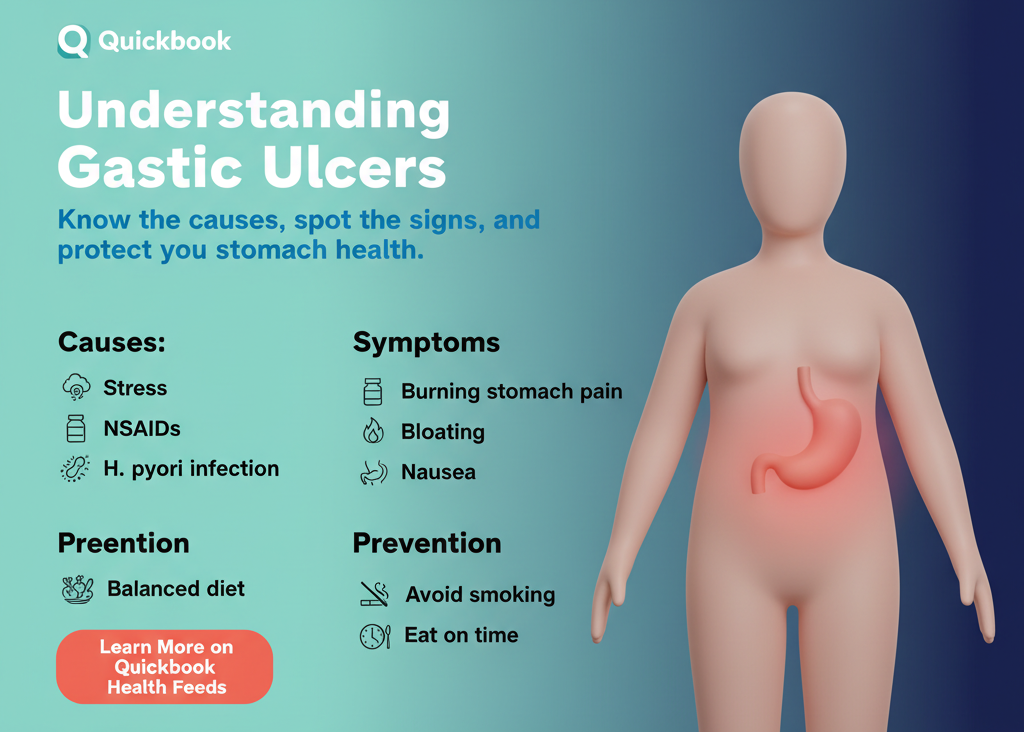








Comments (0)
No comments yet. Be the first to share your thoughts!
Leave a Comment